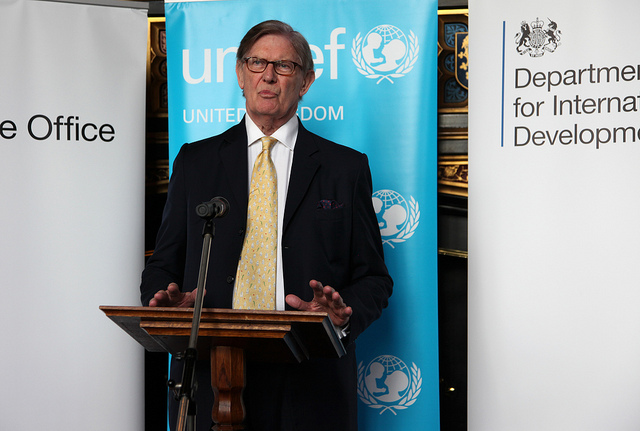National parliaments focus too much on subsidiarity and not enough on the actual content of EU proposals
The Lisbon Treaty granted national parliaments competences in EU affairs as one of the remedies to the alleged “democratic deficit”. The new powers not only redefined domestic parliamentary procedures but also affected the relationship between MPs, parliamentary staff and committees dealing with EU affairs. However in practice, argues Alexander Strelkov in a recent article, the effect has been limited. Most worrying is that MPs in very different parliaments disregard the content of EU proposal, denying themselves the chance to shape crucial national policies according to the preferences of their voters.

Bill Cash, Chair of the Commons European Scrutiny Committee (Credit: DFID, CC BY NC 2.0)
Hopes about the emancipating effect of the Lisbon Treaty on national parliaments have been high among both practitioners and academics. Nevertheless, the Treaty does not prescribe any template on how the scrutiny of EU affairs has to be conducted on the ground. Yet, comparing countries with a strong and a relatively new parliamentary tradition – for example Sweden vs. Czech Republic and Romania – allows understanding whether and how the Lisbon Treaty actually makes a difference.
If the Treaty can empower the relatively weak legislatures of Eastern Europe, sure it will also surely have a positive effect in countries with well-established parliamentary traditions. It is also important to look at the parliamentary assessment of EU proposals that can have a wide-ranging impact, for example those related to pension systems or seasonal labour migration from third countries. Although normally focusing on EU affairs is not considered to bring electoral benefits, the issues of pensions and labour migration are important to the vast majority of voters; hence MPs have an additional incentive to invest time and resources into the analysis of these EU proposals.
MPs, parliamentary staff and committees on EU affairs all have their own stake in conducting assessment of EU proposals in the post-Lisbon Treaty political environment. In general, one could expect that parliamentary staff would obtain more political leverage, while European Affairs Committees would acquire more autonomy from MPs. The reason is greater demand for EU information: the Lisbon Treaty granted national parliaments access to many EU information sources, while their ability to process them remains questionable. Partisan control over European Affairs Committees could become more relaxed because MPs would need to overstep ideological boundaries in order to obtain and discuss information. Also, politicians representing the opposition can have a greater interest in the Lisbon Treaty provisions in order to compensate for the governing parties’ stronger position in determining policy towards the EU.
In practice, parliamentary staff have not been able to capitalise on its role of an information provider. Obviously, it is not about unelected parliamentary administrative staff being able to overpower MPs; it is about parliamentary staff contributing to the analysis of EU proposals through their specialised knowledge. Yet, in the parliaments of Sweden, Czech Republic and Romania MPs rarely demand additional EU expertise, so parliamentary staff has fewer opportunities to make an impact. Moreover, high levels of inter-party conflict in the parliaments of the Czech Republic and Romania generate little demand for in-depth assessment of EU proposals. Last but not least, attempts to politicise parliamentary staff in Romania and the Czech Republic have also curbed its autonomy. Parliamentary staff should not be considered as politically irrelevant ‘paper-pushers’; yet its activities seem to be always capped by MPs.
Contrary to the expectations, European Affairs Committees have remained firmly within political parties’ control. In Sweden, Czech Republic and Romania party affiliation still determines MP behaviour in European Affairs Committees. Moreover, information between MPs in different committees is exchanged mainly along party lines, not official committee lines, leaving less room for inter-party socialisation and contacts between MPs. Most striking is that in the internal hierarchy of the Swedish, Czech and Romanian parliaments, European Affairs Committees are not prestigious. Few political ‘heavyweights’ join their ranks, while the majority of committee seats are assigned to politicians who need to stick to party guidelines in order to secure career opportunities.
Opposition MPs have been more active in using the new scrutiny rules, yet exactly how they do it depends on the general context of inter-party relations – majoritarian or consensual. In Sweden, consensual inter-party relations allow the opposition to be systematically involved in the scrutiny of EU affairs. In the Czech Republic and Romania the situation is different. For example, in 2010-2013 the dominance of different parties in the two chambers of the Czech parliament made the inter-party dialogue very difficult.
What is a real cause for concern is that MPs from both governing and opposition, pro-European and Eurosceptic parties focus on the division of competences and not the content of EU proposals, even if it could bring electoral benefits. For example, the Swedish Social Democrats did not grasp the opportunity to reintroduce labour market tests through the Proposal for a directive on seasonal labour migrants, something what would be popular with its largely blue collar electorate. Czech MPs ignored the Green Paper on pensions in their debate on social security at old age, although different aspects of the EU document could be used by both supporters and opponents of the Czech pension system. Romanian MPs largely neglected important technical issues like potential access of third-country nationals to the social security system. Members of the Swedish, Czech and Romanian parliaments have been warned by respective parliamentary staff of the highly salient technical aspects but decided to focus only on subsidiarity issues.
Obviously, subsidiarity issues and the division of competences between the EU and member states are important. However, it should not come at the expense of analysing the content of EU proposals and exploring the synergies between national and EU interests to create better policies. Subsidiarity is ‘easy’ for MPs as blaming the EU quickly provides political bonuses and does not require a lot of in-depth analysis. The challenge is that if parliaments treat the scrutiny of EU proposals as a simple ‘yes-no’ dichotomy, the discussion of EU affairs may shift from the parliamentary arena to social movements and advocacy groups. This will affect representative democracy as we know it.
—
Note: This article gives the views of the authors, and not the position of Democratic Audit UK, nor of the London School of Economics. Please read our comments policy before commenting.
—
 Alexander Strelkov is a PhD Candidate at Maastricht University in the Netherlands
Alexander Strelkov is a PhD Candidate at Maastricht University in the Netherlands





 Democratic Audit's core funding is provided by the Joseph Rowntree Charitable Trust. Additional funding is provided by the London School of Economics.
Democratic Audit's core funding is provided by the Joseph Rowntree Charitable Trust. Additional funding is provided by the London School of Economics.
Do national governments focus too much on subsidiarity, and not enough on content? https://t.co/iyATt3CYWG
National parliaments focus too much on subsidiarity not enough on the actual content of EU proposals https://t.co/sjjBmbwBBB
National parliaments focus too much on subsidiarity and not enough on the actual content of EU proposals https://t.co/i9qzFjWHuU
National parliaments focus too much on subsidiarity not enough on the actual content of EU proposals https://t.co/8L7Ixp6ci9